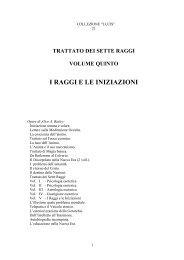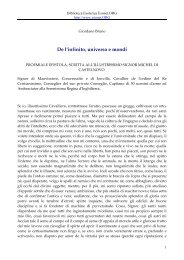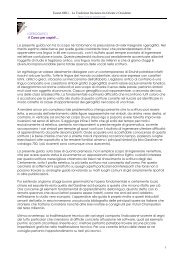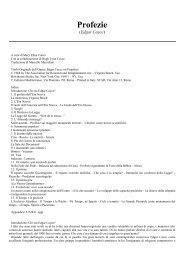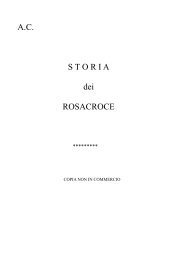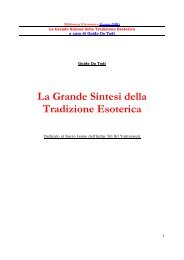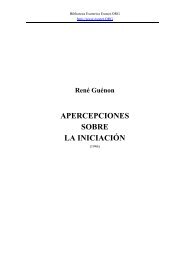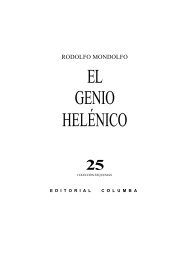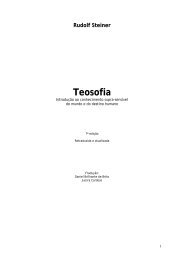Biblioteca Esoterica Esonet.ORG http://www.esonet.ORG 1
Biblioteca Esoterica Esonet.ORG http://www.esonet.ORG 1
Biblioteca Esoterica Esonet.ORG http://www.esonet.ORG 1
Create successful ePaper yourself
Turn your PDF publications into a flip-book with our unique Google optimized e-Paper software.
<strong>Biblioteca</strong> <strong>Esoterica</strong> <strong>Esonet</strong>.<strong>ORG</strong><br />
<strong>http</strong>://<strong>www</strong>.<strong>esonet</strong>.<strong>ORG</strong><br />
pole of an intellectual dualism whose other pole is finitude. For a human mind moved by<br />
the uncertainties of existence, it is much easier to postulate infinity — thus to negate<br />
finitude — than to understand what is implied in existence as a finite whole and in<br />
Wholeness as the undefinable beingness of all wholes. For Wholeness is no-thing, and noone,<br />
because it encompasses all things and all ones, be they predominantly objective or<br />
predominantly subjective. Yet without Wholeness, nothing or no one could exist.<br />
In this sense, the idea of Wholeness is not essentially different from the true Hindu<br />
concept of Brahman. However, a basic difference does arise when the Indian philosopher<br />
speaks on the one hand of the manifestation of Brahman as Ishvara, the Lord, He, or Ish,<br />
and on the other of the non-manifestation of Brahman. In the philosophy of Wholeness I<br />
am presenting. Wholeness can never "nonmanifest" — Wholeness can never "not be."<br />
There is only being, but being oscillates, as it were, between two poles. Unity and<br />
Multiplicity, subjectivity and objectivity. This oscillation is cyclic, and at no time is nonbeing<br />
possible. There are only phases and conditions in which being is predominantly<br />
subjective, and others in which it is predominantly objective. The latter constitute what<br />
we, who are operating in them, call existence or the world.<br />
When the strictly monistic philosopher or the monotheistic theologian tries to<br />
persuade us that the part of our total nature which is under the sway of the principle of<br />
Multiplicity is an illusion of no real validity, he actually contributes to a tragically dualistic<br />
situation. For all that in human nature is subject to the still powerful trend toward selfmultiplication,<br />
analysis, reductionism, and materialism inevitably fights back. Unqualified<br />
monism thus leads to a state of psychological conflict; it defeats the purpose of integration<br />
and forces the One more apart than ever from the Many.<br />
At the present stage of the evolution of human consciousness, we must accept the fact<br />
that the principle of Multiplicity is still a dominant factor in human nature. However<br />
unified our sense of being — our awareness of being "I" — may be, it still has to deal with<br />
and emerge from a multiplicity of organic and cellular voices, each seeking its own<br />
satisfaction. The unity of human consciousness is precious; to make it tyrannical is to call<br />
for "revolution" — neurosis or even total breakdown. We should try to imagine unity's<br />
dominance without forcing the issue unnecessarily. In so doing we are wise if we do not<br />
claim to understand fully a condition of being in which. Unity is lord and master, for such<br />
a condition transcends the "human condition" as it actually is today. Nevertheless, a<br />
sufficiently developed abstract mind can interpret such a condition in terms of a change in<br />
the balance of power between the principle of Unity and the principle of Multiplicity, even<br />
though the mind would not be able to experience the "feel" of being in these states.<br />
Unfortunately, these states usually are spoken of in negative terms — nonbeing,<br />
nonmanifestation, nonactivity, timeless, unconditioned. Such negations, together with the<br />
concept of nothingness, merely reflect the bondage of past and present human<br />
consciousness to the state of objective existence and reveal its incapacity of conceiving<br />
positively of predominantly subjective being in the same way it considers positive the<br />
31



